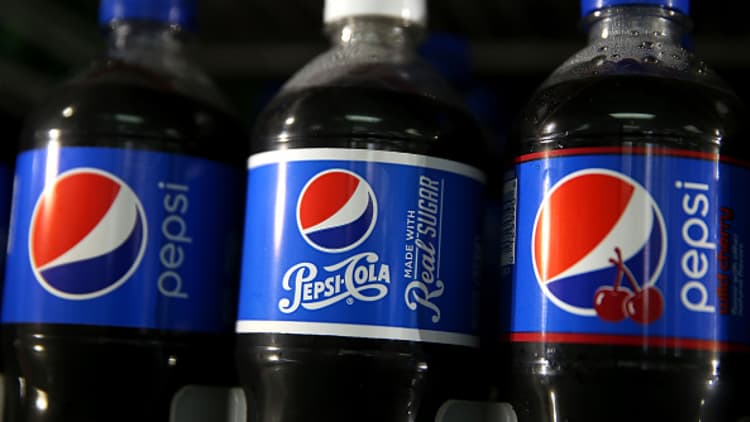"The investment bankers have been knocking on our door forever," outgoing PepsiCo CEO Indra Nooyi told analysts earlier this year when peppered about the possibility of splitting its snack business from its drink business.
With Nooyi stepping down on Oct. 3, will incoming CEO President Ramon Laguarta let them in?
Pepsi's North American beverage business, which includes Gatorade and its namesake cola, is its largest unit and has posted declining revenue as sales of carbonated drinks fall and upstart brands eat into the market share of its non-cola drinks. Its Frito-Lay snack business, meantime, is a $15.8 billion unit that has delivered 3 percent sales and 6 percent profit growth in the three years leading to February.
The differing fortunes of the two have attracted the attention of bankers, analysts and activist investor Nelson Peltz, who had a three-year run in the company in which he pushed for a split. Under Nooyi, though, the company adamantly maintained that keeping the two together gave it necessary combined leverage over retailers.
That stance may change under the company's new leadership. Laguarta, 54, is a 22-year veteran of the company, who has been president since September, overseeing global operations, corporate strategy, public policy and government affairs.

"This transition could open a wider door to Pepsi considering a variety of potential alternatives, including stepped up refranchising ... even potentially splitting up the company," wrote Bonnie Herzog, an analyst at Wells Fargo.
Pepsi has contended that owning both snacks and beverages creates a formidable opportunity to cross-promote, a capability it can highlight in events like the Superbowl when in-store displays pair its soft drinks with snacks such as its Tostitos tortilla chips and Lay's potato chips. It also gives it bargaining power in Europe, where its drinks business dwarfs its snacking offerings.
But the food and beverage giant has struggled to grow both equally.
Pepsi's beverage business last quarter dropped 1 percent, an improvement over a 2 percent fall the previous quarter. Its Frito-Lay snack business, by contrast, last quarter grew 4 percent, up from 3 percent growth the prior quarter.
Those trends reflect broader industry developments, as snack sales in U.S. grew 2.5 percent from 2016 to 2017, while soft drinks grew 1.6 percent, according to Euoromonitor. Carbonated drinks declined 0.8 percent in the same time period.
While Pepsi's soda business continues to be profitable, it faces steep competition from both minnows and titans in fighting for a hold on brands that are growing. Premiuim, calorie-free water brands like Essentia and BodyArmor are threatening its prized sports drink brand Gatorade. The mega-merger that created Keurig Dr Pepper gave birth to a new giant that combines Dr Pepper's distribution network with the brands and restaurants owned by its parent company, JAB Holding.
But in snacks, Pepsi remains king. Its sales force is a powerhouse that towers over the industry and its brands like Smartfood popcorn, Doritos and Lay's continue to pack a powerful punch. Big Food has made the most of the fast-growing category by successfully reviving snack brands through innovation, whereas the industry has struggled in other areas like soup.
Should Pepsi choose to split its snack and and beverage business, it would create a singularly focused drink business like that of its arch-rival Coca-Cola. Coke's stock gained cumulatively 108 percent in the period Nooyi was a CEO, compared with the 79 percent Pepsi gained, according to FactSet. The S&P 500 gained 112 percent in the same time period.
It would also follow suit of companies across the food and beverage industry that have been slimming down as their market dominance is threatened by smaller, nimble upstart brands.
General Mills has said it plans still unidentified divestitures, Kraft Heinz is shedding its Complan Brand in India and Coke is winding down its underpreforming "Zombie" brands.
Slimming down also paves the way for more impactful dealmaking, with most of today's growth driven by brands that are, for consumer giants, below scale. Pepsi built its portfolio through a number of big deals, like its $3.3 billion acquisition of Tropicana orange juice in 1998 and Quaker Oats and Gatorade for $13.4 billion in 2001. But as smaller brands have sold for larger multiples over the past few years, it has been harder for a big company like Pepsi to justify many of the targets.
WATCH: PepsiCo vice chairman on Nooyi's departure



